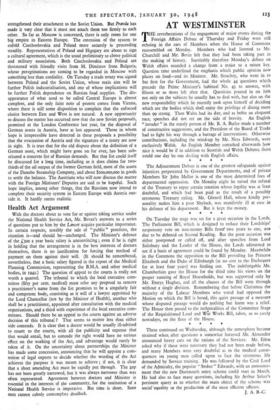Health Act Argument
With the doctors about to vote for or against taking service under the National Health Service Act, Mr. Bevan's answers to a series
of questions put to him by the Lancet acquire particular importance.
In certain respects, notably the sale of " public " practices, the situation is—and should be—unchanged. The Minister's defence of the L30o a year basic salary is unconvincing ; even if he is right in holding that the arrangement is in the best interests of doctors themselves, there is no justification for forcing that method of payment on them against their will. (It should be remembered, nevertheless, that a basic salary figured in the report of the Medical Planning Commission, representing the B.M.A. and other medical
bodies, in 5942.) The question of appeal to the courts is really not worth a quarrel. The tribunal to which the local executive com- mittee (fifty per cent. medical) must refer any proposal to remove a practitioner's name from the list promises to be a singularly fair and competent body, -consisting as it will of a lawyer appointed by the Lord Chancellor (not by the Minister of Health), another who shall be a practitioner, appointed after consultation with the medical organisations, and a third with experience of the local executive com- mittees. Should there be an appeal to the courts against an adverse decision of this tribunal ? That seems to matter less than either side contends. It is clear that a doctor would be usually ill-advised to resort to the courts, with all the publicity and expense that that would entail, but to concede the right would have no serious effect on the working of the Act, and advantage would rarely be taken of it. On the uncertainty about partnerships the Minister has made some concession, announcing that he will appoint a com- mittee of legal experts to decide whether the wording of the Act achieves the purpose it was meant to achieve ; if not, it is clear that a short amending Act must be rapidly put through. The gap has not been greatly narrowed, but it was always narrower than was often represented. Agreement between doctors and Minister is essential in the interests of the community, for the institution of a National Health Service is imperative. But time is short. Sane men cannot calmly contemplate deadlock.


































 Previous page
Previous page